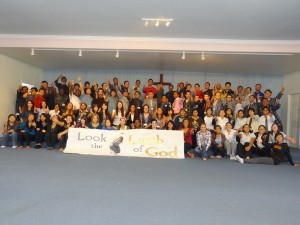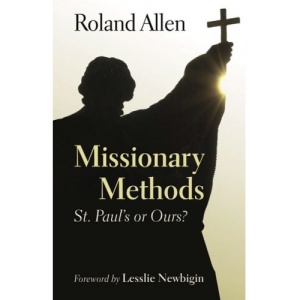Let Local Leaders Lead
 In Manila, I am witnessing a vibrant work of the Holy Spirit in Philippines UBF, which I have not experienced in 32 years as a Christian in UBF USA. John Baik’s recent report of El Camino UBF from 2/28/2012 is encouraging and inspiring with many Americans coming to Christ and being fired up for evangelization through 1:1 Bible study. With UBF Founder Samuel Lee serving my fellowship at UIC, I personally experienced many UIC students becoming Christians in the late 80s and 90s who committed themselves to living for mission. But this influx of students and new Christians has not continued in the past 1 to 2 decades. Why? What, if anything, can be done?
In Manila, I am witnessing a vibrant work of the Holy Spirit in Philippines UBF, which I have not experienced in 32 years as a Christian in UBF USA. John Baik’s recent report of El Camino UBF from 2/28/2012 is encouraging and inspiring with many Americans coming to Christ and being fired up for evangelization through 1:1 Bible study. With UBF Founder Samuel Lee serving my fellowship at UIC, I personally experienced many UIC students becoming Christians in the late 80s and 90s who committed themselves to living for mission. But this influx of students and new Christians has not continued in the past 1 to 2 decades. Why? What, if anything, can be done?
Complacency. A reason for our stagnation and decline might be that we have become lazy, comfortable, complacent and contented with our family and our “settled down lives” in the U.S. We became like Jacob who settled in Succoth (Gen 33:17-20), instead of journeying all the way to Bethel (Gen 35:1). Surely, there is an element of truth to this.
Also, we have stopped going to the campuses to invite students to Bible study. We may have lost our initial “fire,” zeal and enthusiasm, because of the many burdens of life. There is surely also truth to this.
Work Harder. So is the solution simply that we should pull ourselves up by our bootstraps, and repent of our “family-centeredness,” laziness and worldliness, and just work harder to re-devote ourselves for evangelization, “fishing,” and proselytizing? Perhaps, so.
But is this it? Just try harder? Study the Bible more?
Might I propose reasons that some (not all) might find uncomfortable or disconcerting?
 Let Local Leaders Lead. David Garrison, in his 2003 book Church Planting Movements, says that once a missionary has established a church among the native people, the task is to instill in them a passion for starting new churches, not under the direction of the missionary, but by the indigenous leader’s own authority and with their own resources. Could this be a reason why the work of God in UBF has stalled for the most part, except for a few places? Our missionaries are still the ones in authority wherever there is a UBF chapter in virtually all countries. Is this bad?
Let Local Leaders Lead. David Garrison, in his 2003 book Church Planting Movements, says that once a missionary has established a church among the native people, the task is to instill in them a passion for starting new churches, not under the direction of the missionary, but by the indigenous leader’s own authority and with their own resources. Could this be a reason why the work of God in UBF has stalled for the most part, except for a few places? Our missionaries are still the ones in authority wherever there is a UBF chapter in virtually all countries. Is this bad?
Authoritarian leadership. UBF has an authoritarian leadership style, which Jesus explicitly says that his disciples should not do (Mt 20:25-27; Mk 10:42-44). Both Peter and Paul say the same thing (1 Pet 5:3; Phm 8-9). “Lording our leadership over others” just kills the spirit of those lorded over sooner or later, even if they may welcome it at first when they are new “naive” Christians. After 50 years of UBF history, authoritarian leadership is only now being gradually addressed. Surely, everyone agrees that a leader should not “bully” his members in the name of love, shepherding, or “training.” They should gently persuade others, as both Jesus and Paul did in the NT, and as God Himself did in the OT.
With prayer and respect, everyone in the church should be able to freely speak whatever is on their heart and mind. Once someone asked me, “Can we say this in the church?” I was surprised at her question, because the answer is “Of course,” since we are among Christians who love each other. But the reality is that if she vocalized an objection or posed a disapproving question about a leader’s decision, she would be regarded negatively and unfavorably. So, she “shut up.”
There must be friendship, equality and justice. Jesus, our Lord, calls us his friends (Jn 15:15). David Garrison says that a priesthood of all believers among Christians (1 Pet 2:9; Ex 19:6) is the most egalitarian doctrine in the Bible. But when a missionary is the one in authority over indigenous people, equality is only a theory but not a reality, because the missionary who planted the church will always be “a notch above” his converts and disciples.
 Staff education must remove cultural and personal elements as much as possible. Every culture is blind to its own eccentricities and uniqueness. In Korean culture, hierarchy and order is perfectly normal and few would question it. In the U.S., equality, fairness and justice is the norm. When a UBF missionary disciples his American convert, he will inadvertently impose his own cultural values on his American disciple. Unless he consciously “denies himself” to not do so, he will be converting his American disciple to become like a Korean Christian.
Staff education must remove cultural and personal elements as much as possible. Every culture is blind to its own eccentricities and uniqueness. In Korean culture, hierarchy and order is perfectly normal and few would question it. In the U.S., equality, fairness and justice is the norm. When a UBF missionary disciples his American convert, he will inadvertently impose his own cultural values on his American disciple. Unless he consciously “denies himself” to not do so, he will be converting his American disciple to become like a Korean Christian.
 Missionary mistakes. According to Roland Allen’s classic Missionary Methods: St. Paul’s or Ours?, a major mistake of missionaries is that they did too much. The book is available online here. Rather than simply sowing the seeds of the gospel and entrusting the native converts’ growth and development to the Holy Spirit, they over-trained them, thus re-making them into the missionaries’ own image and culture, rather than allowing them to grow into the indigenous Christians that God would have them become. Even after years of ministry, the missionaries continued to impose strict discipline and tight control over the affairs of the native Christians. They did not leave the church in their hands, for they regarded them as immature and “not ready,” compared to the missionaries “high” standards.
Missionary mistakes. According to Roland Allen’s classic Missionary Methods: St. Paul’s or Ours?, a major mistake of missionaries is that they did too much. The book is available online here. Rather than simply sowing the seeds of the gospel and entrusting the native converts’ growth and development to the Holy Spirit, they over-trained them, thus re-making them into the missionaries’ own image and culture, rather than allowing them to grow into the indigenous Christians that God would have them become. Even after years of ministry, the missionaries continued to impose strict discipline and tight control over the affairs of the native Christians. They did not leave the church in their hands, for they regarded them as immature and “not ready,” compared to the missionaries “high” standards.
False sense of importance and indispensability. Let me conclude with a paragraph from Allen that explains why missionaries have prevented the growth of indigenous Christian leaders (Chapter 8):
“The secret of success in (Paul’s) work lies in the beginning at the very beginning. It is the training of the first converts which sets the type for the future. If the first converts are taught to depend on the missionary, if all work, evangelistic, educational, social is concentrated in his hands, the infant community learns to rest passively on the man from whom they receive their first insight into the Gospel. Their faith having no sphere for its growth and development lies dormant. A tradition very rapidly grows up that nothing can be done without the authority and guidance of the missionary, the people wait for him to move, and, the longer they do so, the more incapable they become of any independent action. Thus the leader is confirmed in the habit of gathering all authority into his own hands, and of despising the powers of his people, until he makes their inactivity an excuse for denying their capacity. The fatal mistake has been made of teaching the converts to rely upon the wrong source of strength. Instead of seeking it in the working of the Holy Spirit in themselves, they seek it in the missionary. They put him in the place of Christ, they depend upon him.”
After 50 years of UBF history, many indigenous converts may have already adopted UBF traditions and methodologies, which are culturally Korean, as their norm of Christian life. Can they still be autochthonous? What can we now begin to do as a global ministry for the next 50 years?

Good article, Ben. I think Paul’s example is the best to follow: plant a church and move on. That forced the local Christians to depend on the Lord and not Paul himself. Of course, Paul still had to go back and correct doctrinal issues that were arising in the churches from time to time, but he was by no means a micro manager or one who lorded power over others. In fact, at times he actually goes to great lengths to authenticate his apostleship (Gal 1), and yet it is always with an air of humility (1Co 15:8-11; 1Ti 1:12-16).
Darren, Apostle Paul’s example is indeed enlightening. In fact, there seems to even be evidence that he stayed too long in at least one place. I am seeing there is *much* to learn now that I let Scripture speak and try to understand the text as it is. I am finding that most of my thousands of hours of Bible “study” were really “self-appeasement sessions” where I searched for proof of my/UBF ideas or on my “one-to-one” performance for that week, instead of listening to the voice of God and obeying Him.
Ben, as you know, I agree with your message. Last year, after reading Roland Allen’s book, I was stunned at how different the Apostle Paul’s discipling methods were from what I personally experienced in our cross-cultural church. I wrote a report on Roland Allen’s book and shared it with our senior leaders. A couple of them responded, but most remained silent. Perhaps they will respond someday. We desperately need to have an open dialogue about this. In the meantime, if anyone would like to see a copy of my report, please email me (JosephLSchafer at gmail dot com) and I will be happy to send it to you.
Joe, as you know, I thought your report was profound, excellent and sorely needed in UBF. I would encourage people to read this report. The report is not “Karcher style” in any way, so even UBF leaders should be able to read it :)
I would vote for your report on Roland Allen’s book to be the most “historical” document ever published by a UBF member.
Thanks, Darren. When Paul authenticated his apostleship in Galatians, it was to refute the “works” that the legalists (Judaizers) tacked onto grace. It was never to say, “Keep spiritual order. Just obey.”
To some of our missionaries, their innermost core value is honor rather than humility. That’s why a major problem of our missionaries is their difficulty in being corrected, or shown that they said or did something unbiblical. Their strong sense of honor is being violated and challenged, and they do not respond well or humbly, in my opinion.
Again, I will say that this does not apply to all missionaries.
Thanks for sharing, Ben. Your words in this article are refreshing and encouraging to me. I suspect these words will be further “thorns” in many UBF leaders unfortunately. Still, these are thoughts that are long over due for public discussion.
For example, this part of the quote is exceedingly helpful, true, insightful and most of all: exactly what I and over 100 people experienced the last 25 years in Toledo UBF: “If the first converts are taught to depend on the missionary, if all work, evangelistic, educational, social is concentrated in his hands, the infant community learns to rest passively on the man from whom they receive their first insight into the Gospel. Their faith having no sphere for its growth and development lies dormant.”
People simply need room to breathe, pray, live, fail, succeed, try and work on their own. If not, the ministry implodes.
You asked, “What can we now begin to do as a global ministry for the next 50 years?” Here is a suggested start (all of which you have already done, Ben :)
1) Publicly reject the parts of the 50th anniversary blue book teachings/mission statement that are non-Christian.
2) Publicly apologize to all ex-UBF members from 1958 to 2012, admitting that the well-intentioned UBF shepherding methods have too often wrongly degraded into lording-it-over dictatorship.
3) Create and publicly publish a chapter/regional/committee plan to move away from the Moses-style leadership dominated by Koreans and move toward a plurality of elders style leadership dominated by new national leaders.
4) Encourage every Korean director and senior UBF staff to engage in the dialogues here on ubfriends for at least 1 year.
My public promise to senior UBF leaders is this: Do items 1 to 3 above and have at least 10 Korean directors commit to 1 year of regular ubfriends blogging/articles and I will stop my vocal criticism of UBF.
Brian, to my ignorance, I am unfamiliar with the UBF Blue Book. I Googled it and read part of your review of it at your blog, but I was wondering if you have an electronic copy that you could send to me.
Darren, here is a link to a scan of the last lecture. The “blue book” has a blue cover and is a collection of the lectures given at the anniversary celebration in Korea. I have the actual book. Note that an online version of this last lecture was published on ubf.org, but it was modified for the public from the printed version distributed to directors (well, not every director got one, but I did).
http://www.priestlynation.com/wp-content/uploads/2012/04/2011ubfBlueBook-LastLecture.pdf
I am concerned about being sued for copyright infringement, so I can’t share any more. You’ll have to buy one for $10 from ubf press.
Thanks. Maybe I should buy one just to look at it, although it is probably not worth $10. I will look over what you sent me at least.
Hi Brian,
You and I and anyone who reads this knows that your 4 proposals would not be welcomed or responded to. Why?
In my opinion it is because of the strong honor culture that is so prevalent in our UBF tradition and culture, which was also prevalent when western missionaries went to 3rd world countries to evangelize over the past century.
To do what you propose would be like asking a heroin addict to stop cold turkey after being an addict for many decades, or to ask one addicted to porn for decades to never ever watch porn again.
For our leaders who grew up in an honor culture, some would rather commit suicide than to publicly admit wrongdoing. In their mind and feeling, it brings too much shame to them, to their families, and to UBF for them to do so.
A new article I may write is “Why a Strong Honor Culture Denies the Gospel of Grace.”
Ben, I agree but only partially. Your point about drug addiction is valid. The “diagnosis” as I see it is glory addiction or power addition or perhaps honor addiction. Just as in drug addictions, there must be a stopping point, and the initial withdrawal symptoms will be painful. I and my friends have talked about this. Some of us equate leaving UBF with “detox”.
Fortunately for me, I began an 8 year detox from UBF in 2003. The past 1 year has been a recovery period after I quite “cold-turkey” in 2011. Since the diagnosis of the UBF problem is akin to drug detox, I think our voices here are part of an intervention program (dare I say orchestrated by God Himself?)
Yes, in regard to my 4 points above, I expect zero response now. But as I said on my blog, I blog for the future. I do expect some day in about 5 years or so, when I and others have moved on, someone will read this blog and have material to fall back on.
If dialogue were possible, I think my suggestions are not so off-base. However here is the reality (please correct me if I get this wrong or incomplete).
In regard to dialogue between UBF and ex-UBF:
No meaningful dialogue was generated in 1976
No meaningful dialogue was generated in 1989
No meaningful dialogue was generated in 2001
No meaningful dialogue was generated in 2011
No meaningful dialogue was generated by ex-UBF Koreans.
No meaningful dialogue was generated by BenT for over 8 years (until now?)
No meaningful dialogue was generated by JoeS for over 10 years
No meaningful dialogue was generated by BrianK for over 1 year
So we have 50 years of silence and zero meaningful dialogues from Korean director with ex-UBF people.
Slowly trying to change hasn’t worked. Secret change hasn’t worked. Bold actions haven’t worked. Polite actions haven’t worked.
What can be done?
Hi Brian,
I can’t speak for others. But for myself, I and others began to increasingly vocalize problems and issues about 6 years ago. It is all expressed on UBFriends explicitly without parables, as well as in private conversations, and by email with anyone who wishes to dialogue. Some will not dialogue either in person, or in groups or by email. I cannot do anything about that.
What have I learned if anything?
1) Most importantly, I am a sinner. Only by God’s grace I may love those who do not wish to dialogue, and may never want to, just as God has loved me.
2) Next, by perseverance and persistence and by God’s grace, there are gradual changes, which may not be complete or even satisfactory in our lifetime.
3) God is fulfilling His own plan and purpose which very often seems to be the very opposite of my own expectation or preference.
4) God is good and God is love, even toward those who have hurt and wounded others. God is good to Paul, even though he was the church’s public enemy No. 1.
5) I am having the time of my life, which is nothing but the unmerited and undeserved grace of Jesus.
I’m sure others have their own intimate experiences with the Holy Spirit which may be even more exhilarating.
This is a quote in an article on Syncretism:
“Certainly there are biblical essentials that every new Christian needs to know, such as prayer, worship, witness, fellowship and ministry. These practices, however, should fit the local culture under the leadership of the Holy Spirit rather than the practices of the host culture of the missionary. Syncretism occurs when the evangelizers impose their cultural values on the new Christians and fail to separate the evangelizers’ own culture adequately from the biblical message.”
@Darren. When you get a chance to look into it, let me know what you think about the blue book, which is supposed to represent our 1st 50 years of UBF history. Or does this just represent a segment of UBF?
See if you agree with Paul’s key theological motif: Gentiles are saved by faith and do not have to adopt the Jewish way of life in order to become authentic Christians?
Thus, does it follow that native leaders DO NOT have to adopt the missionaries’ way of life in order to become a genuine Christian, saved by faith and not by works?
Based on my in-person meetings in Chicago UBF over the weekend and more than 25 hours of in-person dialogue in just 4 days… I feel that this article, “Let Local Leaders Lead”, is perhaps the most important discussion that needs to be had.
And I feel that the most significant questions facing UBF missionaries are these: Should a missionary share his culture with the natives and change natives to be like him? Or should the missionary adapt and contextualize the gospel in the land they are living in? What is the role of a Christian missionary in a foreign land?
These are my short answers:
Should a missionary share his culture with the natives and change natives to be like him?
No. The problem is that perhaps most missionaries DO NOT REALIZE they are sharing their culture with indigenous peoples. So, can they be “faulted” when they do not know?
Or should the missionary adapt and contextualize the gospel in the land they are living in?
Obviously. But since UBF has generally been “weak” or “non-existent” in contextualization over the last 50 years, I don’t believe we will be even clear as to how to begin to educate ourselves in this very very important area.
What is the role of a Christian missionary in a foreign land?
Acts 14:21-23.
So it seems to me Ben, that you are saying we natives need to become missionaries to the missionaries? Sounds like a good idea actually.